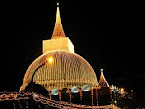In our daily life, we come across some unhappy feelings. Particularly, when one is engaging in some unwholesome act, thoughts occur in mind are not pleasant. People do evil acts with evil thoughts. Those evil thoughts are associated with evil minds. This episode introduces the evil thoughts associated with evil minds.
In Chiththa Paramaththa 12 types of Akusala Chiththas were described. Associated with those Chiththas there are 14 types of Chethasikas. Those are known as “Immoral Mental States” or Akusala Chethasikas. 14 of them could be categorized as below;
- Moha Chathushkaya
- Moha – Delusion
- Ahirika – Shamelessness to commit wrong
- Anoththappa - Fearlessness to commit wrong
- Uddhachcha – Restlessness
- Lobha Thrikaya
- Lobha – Attachment
- Dhitti – Misbelief
- Mana – Conceit
- Dhosha Chathushkaya
- Dhosha – Hatred
- Issa – Jealousy
- Machchariya – Avarice
- Kukkuchcha – Worry
- Thina – Sloth
- Midhdha – Torpor
- Vichikichcha – Doubt
The first four mental states are common to every immoral consciousness. Therefore, they are known as Sabba Akusala Sadharana Chethasika. Lobha or Attachment is found in 8 types of Lobha Mulika Chiththas or the Consciousness rooted in attachment. Mibelief or Dhitti is found in 4 types of consciousness accompanied by wrong view (Dhittigatha Samprayuktha) and Conceit or Mana in 4 types disassociated with wrong view (Dhittigatha Viprayuktha).
Chethasikas contained in Dhosha Thrikaya is found with two types of consciousness rooted in illwill (Dwesha Mulika Chiththas). Sloth and Torpor (Thina – Middha) is found in 5 prompted consciousness (Sasankarika) of Akusala Chiththas and Doubt (Vichikichcha) is found only in the consciousness associated with doubt in Moha Mulika Chiththas.
Now each of these Chethasika would be elaborated in detail.
(1) Moha – Delusion
Moha clouds one’s knowledge with regard to Kamma and its consequences and the four noble truths. It obstructs one to understand the real nature of an object. When one is performing any evil act, the consciousness arise is always associated with this Chethasika.
(2) Ahirika – Shamelessness
This is not the ordinary shamelessness. This is the shamelessness to commit wrongful acts and of their consequences. The opposite of this Chethasika is Hiri and is a moral mental state. The one who doesn’t have Hiri would commit any evil act as that one is not ashamed of doing it. This Chethasika is also common to all immoral consciousness.
(3) Anoththappa – Fearlessness
This is again not the ordinary fearlessness or braveness. It is the fearlessness to commit any evil act and of their consequences. When one is performing any evil act that person is not fear of its consequences. Therefore, this mental state is also found in any immoral consciousness.
Usually these two Chethasikas: Hiri – Oththappa is found together. Even in the ordinary meaning these two are considered to be two of the dominant factors in the civilized world as its absence make the society wild.
(4) Uddhachcha – Restlessness
Being one of five hindrances, Uddhachcha is the unsettled state of mind. When one engages in an evil act, that person’s mind runs here and there due to the nature of that unwholesome act. This is the mental state with regard to that nature. Yet again this is together with above three Chethasikas common to all immoral consciousness.









0 comments:
Post a Comment